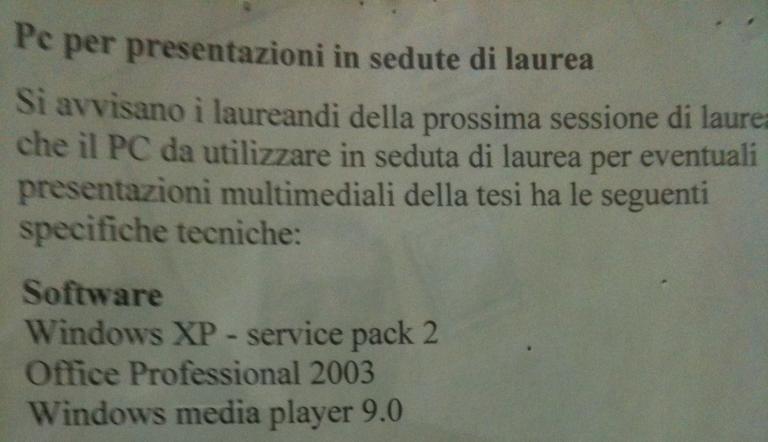All Posts
Want to present your thesis? Please be compatible with Windows
Last week I had a weird experience. I went to the Department of Communications and Social Research of the Faculty of Communication Sciences of La Sapienza, the first and biggest University in Rome. The reason I went there was to attend the presentation of the Italian Manifesto for Open Government, on which I’ll report soon in another article. The promoters of the Manifesto spent the whole morning explaining in detail all its ten articles, including the fourth and fifth that strongly assert the importance of opening public data, that is publishing them without restrictions in open file formats. They explained this in a room whose entrance was right in front of a billboard on which the Faculty staff had pinned this notice (thanks to Flavia for taking the [picture):
Did you know that in Naples, in Federica Square...
Piazza Federica (Federica Square in Italian) is the “3D virtual square” that should constitute the innovative web-learning system of the Federico II University in Naples, Italy. I already reported in another article that Penguins can’t enter Piazza Federica, explaining why that is bad for a service of a public University. In additions to those penguin barriers, however, there are other things I don’t understand in the public service offered by Piazza Federica.
Why can't Penguins enter Federica square?
In november 2010 I discovered the existence of Federica, the tridimensional virtual square" that should be the innovative web-learning system of the Federico II University in Naples. Out of curiosity, I decided to visit it and all I got was a black screen and some perplexities. Some of them, which I described in another page are on the very sense of a website like that, others are more specific. I got a black screen because I use Linux, while (quoting from the University website):
After Umberto Eco, even Franco Debenedetti gets ebooks wrong
In August 2010 Umberto Eco, a great Italian intellectual and novelist wrote something very true about traditional paper books: don’t you dare to hope to get rid of all paper books just because e-books are now available. Unfortunately, Eco gave a really dumb proof for his assertion:
